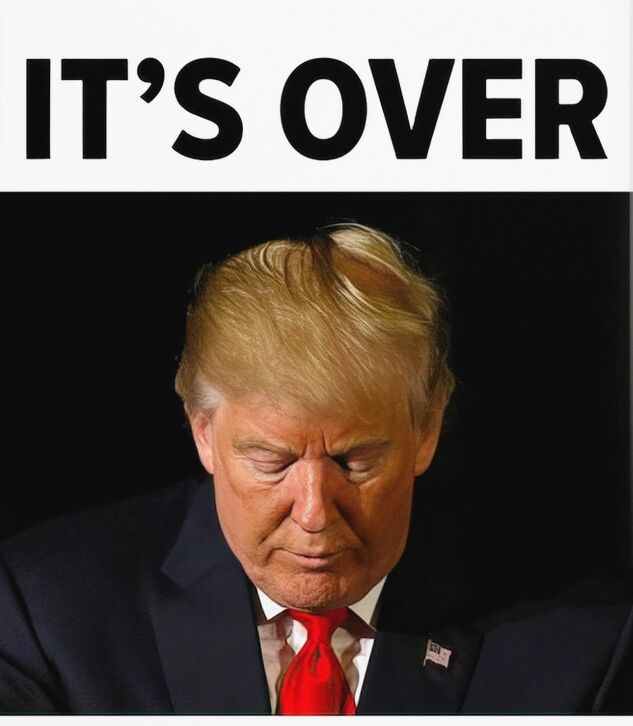Podcast: Play in new window | Download
Subscribe: RSS

It’s over soon not because of the criminal charges, the hideous behavior, the fascism or the increasingly lunatic speeches. It’s over because of the numbers he doesn’t understand.
Part 3. The Third Decision
In order to participate in an election, a citizen of the United States has to make, and act on, three decisions.
- One must register. This is a decision to participate actively in civic life, and requires making an effort — going to the courthouse, or doing some paperwork, or participating in a registration drive. (I am not among those who think registration should be automatic and effortless. I think anyone who wants to participate in choosing our legislators and governors should be willing to — and capable of — making the required effort.)
- One must decide which candidate gets one’s vote. The quality of this decision varies. Some vote along party lines, some according to a fleeting impression, a few after deep study of the candidate’s platform. Some decide a year in advance, others as they are walking into the polling place.
- The third decision — one which is ignored by most commentators, which is not taken into any account by most polls, yet which can be critically important — is whether, after registering to vote and deciding for whom to vote, one does not bother to actually vote.
Some commentators will mention “turnout” after the fact, if it was unusually low or high; and some polls will try to gauge how enthusiastic voters are about their candidate (but never how bored or repelled voters are by their preferred candidate). But this third decision is a critical variable in electoral decision-making and rarely receives the attention it deserves.
There are two things that play a large part in making a potential voter determined to follow through no matter what; a likable candidate and/or an exciting agenda.
All candidates, with the exception of Donald Trump, seek to be likable. One of the most successful campaign slogans of all time was “I Like Ike,” playing up the fact that masses of people adored Dwight Eisenhower. When told that Barack Obama had selected Joe Bidden to be his running mate, Republican John McCain blurted out. “Nobody doesn’t like Joe Biden.” On the other hand, one of the most spectacular campaign failures of recent times was that of Florida governor and presidential aspirant Ron DeSantis, who mounted a respectable organization, did most of the right things, only to find that when voters got to know him, they really didn’t like him.
In order to be, or at least seem likable, most candidates project sunny optimism; Trump invokes decline, rampant crime, economic ruin and world war. Most candidates promise a tranquil future; Trump talks darkly of depression, mass deportations and concentration camps for immigrants. Most candidates minimize differences with opponents; Trump savagely attacks and ridicules people who disagree with him (as well as war heroes and physically impaired people) and vows retribution. He whines, he complains, he threatens, he lies, he never apologizes. And he cheats at golf. He may be the most unlikable presidential candidate in American history.
The other thing that most candidates do is try to make sure they are on the right side of issues. When they are not, they shut up about that issue and hope it doesn’t come up in the campaign. Not so Mr. Trump. He must have been told that between 65% and 80% of Americans — including a majority of Republicans — disapprove of the overturning of Roe v. Wade by the Supreme Court, and favor preservation and/or restoration of abortion rights. But Trump brags frequently about being responsible for overturning Roe v. Wade, and his allies promise ever more draconian bans on abortion. They have thus ceded to Biden and the Democrats one of the most powerful political motivators of our time. He is similarly at odds with American voters on most other issues he has chosen to emphasize.
So as we’ve seen here, Trump starts at a severe disadvantage because of the numerical makeup of the electorate, and the most powerful attributes that could help him overcome the disadvantage — likability and a popular agenda — are things he doesn’t have and doesn’t seem to want.
Despite everything, Trump seems (as this is written, in May) to be strong in the polls and Biden is being portrayed as weak. We will deal with that misperception in Part Four of our series By the Numbers; Why Trump Cannot Win titled The Great Poll Faults.
The guy lost the popular vote twice. If he breaks that streak, I would be surprised
get ready for 2016 redux. nobody gave trump a chance then, either. biden is more unpopular than hillary about now. rfk jr will steal votes from both sides, but just sayin….
Though a life-long Democrat, I actually voted for Trump the first time – I hated Hilary’s ‘Glass Ceiling’ bull crap, and I thought she had been a terrible Secretary of State. But the second time I voted for Biden, and shall do so again. Policies make a difference, but in truth, I just grew to dislike the fellow. Many Republicans dislike Trump as well, and even Evangelicals are losing their enthusiasm for him.
Nikki Haley retains considerable influence with moderate Republicans and could be a game-changer either way. So far Trump and Haley have not come to terms. However, if she endorses Trump, he has a chance. If not, then I would agree that he won’t be able to pull off a victory.